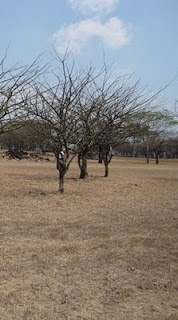 |
| The team carrying record bags and the vaccine cooler |
 |
We walked to a ridge on the side of the
volcano, where there was a welcome breeze |

"It's not about the numbers, but the person."
The list of visits for the day included the names of 74 children. Of the 891 persons living in the neighborhood, 74 were under 5 years of age, and their vaccination records needed to be checked. In communities with health promoters, the vaccination rate is 100%. Each family receives 8 visits per year, for vaccinations, holistic education, and water monitoring. Keeping track of water storage and disposal is critical in the fight against
dengue and chikungunya.
Vaccination records are kept by the promoters in plastic-covered notebooks. These log books are meticulously scrutinized by the clinic directors, and by the bosses of the clinic directors. Each child or adult keeps his or her personal book of vaccination and medical records at home. Children have green books. Pregnant women have their own special books. The information in the patient books is cross-checked to be sure that it matches the information in the clinic notebooks.
"It's not about the numbers, but the person."
Elias said that. He has been a health promoter since 1982. We walked under umbrellas to fend off the sting of the hot sun. "Rattle, rattle, rattle," we shook the gate or "knock, knock, knock" we rapped against the metal door. "Hi, we're here from the
Unidad de Salud! Bring your
tarjeta (vaccination record," the nurse sang out. Sometimes we were invited inside. Sometimes, vaccination books were poked at us through holes in barbed wire fences. "There was trash and smelly water EVERYWHERE," I recorded in my journal.
 |
| Elias talking with a young mom about hygiene |
As we went from home to home, Elias poked his nose into the
pilas (water storage basins) and containers, looking for mosquito larvae. "A few little tilapia will eat those larvae right up." Tilapia seemed to be the preferred method of pest control here, as opposed to the permethrin sachets which are also commonly used. Every now and then, Elias would sidle up behind the nurse and female promoter to listen more closely. "Have you had your annual pap smear?" he would occasionally interject, following up with a little speech about how important it is for women to have annual gynecological exams. He was very comfortable in his role: The Team Dad.
Literally, Elias is the Team Dad. His daughter became a health promoter in 2008, and works right along side her father. Watching the two of them working together was quite a treat. He watched his daughter with pride sparkling in his eyes. She nurtured the relationships which he had grown over the years. We met families who lived in a wide set of circumstances. Our route came to its end in a neighborhood which had a wide street and homes made of concrete block. The morning shift of school let out, and a big group of kids ran down the road to greet us. "Hello!" "Good afternoon, how are you?" Children are always eager to try out their English on a couple of native speakers. We walked up to the school to visit an adult technical training program for aspiring beauticians. If we return, they will want to cut and dye our hair!
 |
| Beauty School Class |
Practically melting from the long walk in the sun, we decided to wait inside a little cafe for the pick-up to come and get us. The cafe consisted of a few picnic tables under an awning outside of someone's home. Pupusas were frying on the griddle, but it was too hot to think about eating. We talked about the morning's visits, marveling that out of all 74 children, only one needed a vaccination in order to be up-to-date. The conversation became a little more serious as we spoke about struggles with violence in the neighborhood. Elias was the dad, the protector: of course it was best to sit inside while waiting for the pick-up. Sometimes we are oblivious to the care which is being given us. The hostess brought out ice cold orange soda for our little group. She refused payment, just delighted to give us this small gift in gratitude for our visit and for the work of the health team.
 |
| Vaccination delivered. |
We returned to the clinic, and said our good-byes, and we were all just a little bit sad. Our week working with the
Unidad de Salud in Nejapa was amazing. We learned so much in just one short week and gained incredible respect for the community-based work of healthcare professionals who bring basic care and education to the people who are most in need. The openness of the
Unidad de Salud to team up with the Salvadoran Lutheran church is a huge blessing and an opportunity to bring improved access to quality healthcare to people who live in poverty.


 "It's not about the numbers, but the person."
"It's not about the numbers, but the person."





I really love your stories, you express yourself about our people and children as persons, and sometimes here we just forget we are.
ReplyDeleteGo on!!